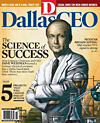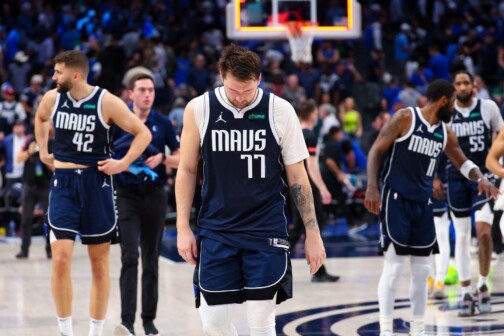As ceo of imprimis, one of the country’s premier staffing companies, Valerie Freeman spends much of her day sitting at her desk. It’s a privilege compared to when she started her company 25 years ago and spent days sitting under her desk, making sales calls with one finger in her ear.
 |
| RISING TEMPS: Imprimis CEO Valerie Freeman finds jobs for qualified workers. photography by Andy Lai |
In 1980, Freeman was a professor on the business faculty in the Dallas County Community College system when she saw the future. “Word-processing technology had just come on the scene, and I was getting calls asking if we had peopled trained to use the equipment and to manage the issues around it,” she says. “These systems cost as much as $20,000, and that was a lot of money then. I knew whatever the future was going to be, it was going to be electronic.”
Freeman took $5,000 out of her retirement fund; rented an interior office with no windows; moved in two desks and two word processors, which spat out letters and contracts; and, because of the racket, took shelter under her desk to make phone calls. “It was an inauspicious beginning. I didn’t really know what I was doing,” she says with a laugh.
It may have been a simple start, but it was successful right from the beginning. One of the elements that Freeman identifies on her own path to the top is the number of people who helped her. As any entrepreneur knows, growth is good—until growth is too fast and the need for more capital outstrips its source. “After about eight months, I was sitting in the kitchen and I realized I didn’t have enough to make payroll,” she says. “My father-in-law loaned me the money. Then I needed a line of credit, and no bank would give me one.” An accountant friend took her to his bank and told the representatives there to give her a line of credit. “I just sat there. He did all the talking.”
It didn’t take Freeman long to start talking for herself and her business. “I could see that no one in Dallas knew anything about this new technology,” she says. “And it wasn’t just how to use the equipment. It was how to manage the issues that the technology generated.”
Along with the new horizons opened up by technology, Freeman saw an opportunity in the thousands of people who were out of work. “In 1982, the unemployment rate was just under 11 percent, the highest in years.” Back then, she recalls, the “temp” business, as it was called, was held in low esteem, and businesses thought people who “temped” were just employees who couldn’t get a real job. Freeman thought otherwise. Her background in education told her that unemployed people had a lot of potential. They just needed a new business model to match what they had to offer with what businesses needed—talent—and understand what they didn’t need—more permanent costs, which limit flexibility.
Freeman had decided that education was not the career track she wanted to make her life’s work. “I never thought of myself as a CEO,” she says. “I thought I would be a college professor, finish a Ph.D., and become a university professor, and I chose education because the business world was still quite hostile to women in those days. I thought I could establish myself in an educational setting, and I knew one thing: I didn’t want my mother’s life. Growing up (in Houston), all the mothers stayed home, except for one who had to work. And everyone said, ‘Oh poor her,’ because she had to work. I knew I wanted opportunity.”
And that opportunity was a business of her own. Now, the “staffing industry,” as it’s called, is well-established, having outgrown its initial stigma. Imprimis, too, grew. First, it outgrew its original name, WordTemps. “We hired The Richards Group to develop the new name, which means ‘first among many,’ and we were the first staffing company to use a name without a reference to its industry,” she says.
Imprimis services about 1,000 clients a year and has anywhere from 800 to 1,200 people working for it on a given day. In 1993, Imprimis began to develop specialty divisions starting with Art Squad and M Squad, which provided creative and marketing talent (and whose output covers the walls at Imprimis’ modern, chic headquarters on LBJ). In 1996, Freeman’s company started Bravo Technical Resources to provide information technology professionals. Today, the company has eight divisions and five specialty firms serving populations such as “mature personnel” and areas like third-party pay.
THE TAKEAWAY |
1. Good ideas outlast bad reputations. 2. Smaller clients deserve as much attention as larger ones, and they appreciate it much more. 3. Women have a different leadership |
Kathy Leonard, president of Advantage Retail (an Omnicon company) and a long-time client, says one of the things that’s made Freeman a success is that she makes every client a priority. “Our company is not a large client, but Valerie pays as much attention to a small client as a large one,” Leonard says. “And she is just as careful with the professional associates on our account, and that’s one of the things that makes her successful.”
Freeman identifies a number of role models, none more important than real estate legend Ebby Halliday, with whom she has served on the Dallas County Community College District Foundation board. “I’ve watched how she operates, how kind she is, how she takes time to write personal notes. She has inspired me,” Freeman says.
Freeman made a significant commitment in two areas, beginning with involvement in the community. Her list of board memberships fills a lengthy paragraph and includes a long relationship with the DCCCD Foundation, several chambers, Leadership Texas, and others.
Her second commitment, and virtually a second full-time job, has been mentoring women in business and in leadership positions. Ask any professional woman in North Texas, and you’ll find that the proverbial six degrees of separation has shrunk to one or two in Freeman’s case. She has spent 25 years creating or nurturing nearly every woman’s organization and woman’s leadership initiative. She sees this as a two-way street. “I learned more about leadership from nonprofit organizations than from anything else,” she says. “When you head a group of people you didn’t hire and can’t fire, you learn how to get them to move in the direction you want.”
She credits two groups of women CEOs with playing a huge role in her own success and her ability to cope with the roughest patch in the company’s history, the aftermath of 9/11. One group rotates monthly between the members’ homes and discusses a wide variety of professional and personal challenges, and a second is a formal part of the Greater Dallas Chamber. Freeman found a lot of support through them for hard choices she had to make. “Our industry was having a hard time because of the dot-com bust,” she says. “We’d been at fever pitch during the ’90s. 9/11 was horrible. It’s awful having to let people go when they’re good, loyal people who’ve done nothing wrong.”
As fervently as she has mentored women in the marketplace, Freeman is matter-of-fact about the sometimes controversial topic of gender differences. She thinks women do have a different leadership style. “Women are more relationship-oriented. I know that’s a cliché, but it’s how we’re socialized. It’s in our DNA,” she says. And she dismisses the hot topic of work/life balance, noting, “I think it depends on the person. We have a lot of people here who work very hard, and they get very upset at people who aren’t working as hard. Work/life balance is an issue, but some people want to get ahead, and they’re going to work really hard.”
Freeman gives a lot of credit to her husband of 37 years, who now works for the company. “He is extremely supportive of anything I want to do, and he is happy for my successes,” she says. The couple made their own choices, including a decision not to have children, perhaps one reason she is devoted to friends and mentoring.
After 25 years at the company, Freeman says one of the things she has learned is to relax. “I was far too serious for too long,” she says.
Kathy Leonard has seen evidence of Freeman’s lighter side. “We were at an Executive Women’s Roundtable retreat, and there was a pajama party one night,” Leonard says. “Valerie and I were roommates, and she put on flannel pajamas and giant bunny slippers. Then we realized we had to walk through the lobby and over to the other side of the (Hill Country) Hyatt. Everybody looked at us, and I thought, ‘What a neat person who can run a business but still have a lot of fun!’”
Besides having fun, Freeman says most of the important lessons of being a successful CEO are common sense: Treat people right; be positive, not negative; mentor others; realize that there’s no place for yelling and demeaning behavior in the workplace; and work hard. For a long time. She plans to follow in Ebby’s footsteps “and be running things at 96.”
 |
Merrie Spaeth is one of the pre-eminent crisis management strategists in the world. After serving as President Reagan’s director of media relations, she founded Dallas-based Spaeth Communications in 1987. She is also a lecturer at Southern Methodist University’s Cox School of Business.




